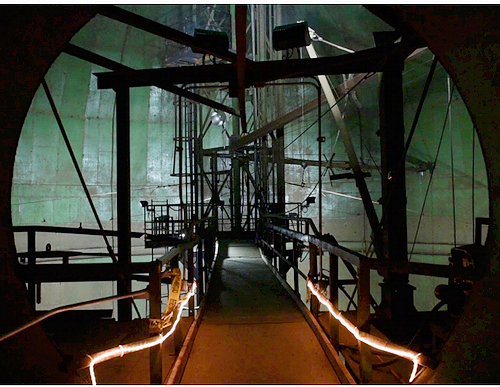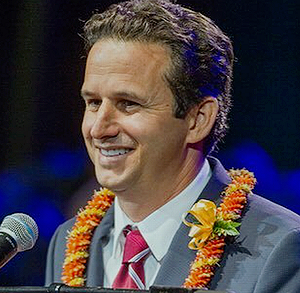
HONOLULU, Hawaii, February 19, 2022 (ENS) – President Joe Biden has signed into law a bill to avert a federal shutdown that funds the government, but only through March 11. It’s important for Hawaii because the bill also provides the Pentagon with some $350 million to strengthen its response to a contaminated drinking water emergency at the Pearl Harbor military installation on Oahu.
The White House announced Biden signed the short-term funding bill Friday, one day after the Senate passed the legislation by a 65-27 vote. The House of Representatives passed the measure February 8.
Lawmakers included the new money to address the ongoing water contamination crisis stemming from the Navy’s Red Hill Bulk Fuel Storage Facility at Joint Base Pearl-Harbor-Hickam. Red Hill is located in the O’ahu hills above the military base, and was originally constructed from 1940 to 1943 to prevent enemy attacks on U.S. military fuel supplies during WWII.
But today the fuel storage facility endangers O’ahu residents. Red Hill is located directly above an aquifer that hundreds of thousands of Honolulu residents depend on for drinking water.
Last November, after some residents on the base complained that their water smelled awful, officials found a petroleum leak from the World War II-era fuel storage facility into the drinking water serving the military housing at Pearl Harbor.
Since the spill, roughly 4,000 military families were moved into hotels, and about 6,000 people have been treated for nausea, headaches and rashes, military officials have said.
The new funding measure provides some $250 million to the Navy, Marine Crops, Army and Air Force to “cover expenses related to drinking water contamination.”
State Health Department Orders Fuel Removal, Pentagon Appeals
The funding also provides the Pentagon with another $100 million to make emergency infrastructure improvements and remove fuel from the facilities, as ordered by Hawaii state health officials.

But on February 2, the Pentagon appealed the Hawaii Department of Health order to drain fuel from Red Hill in state and federal court, in a decision that drew swift rebuke from state officials and members of Hawaii’s congressional delegation.
The state Health Department called the DOD’s decision to appeal disappointing. “The Navy committed to Congress and in multiple public forums that it would comply with the emergency order,” said Hawaii’s Deputy Director of Environmental Health Kathleen Ho.
Deputy Secretary of Defense Dr. Kathleen Hicks said January 31, “We continue to take actions to address the November release and contamination, including the restoration of safe drinking water. And we have launched a thorough review of the facility’s long-term future, to include the option of permanently defueling Red Hill. We will continue to do everything that we can to protect the population, the environment, and the security of the nation. We are confident these goals are mutually supportive and can coexist.”
“As to the long-term future of Red Hill, we are on an aggressive schedule to analyze and determine the distribution of fuel reserves for our operations in the Pacific theater,” Dr. Hicks said “Separate from the independent third party assessment, this analysis by the Department of Defense will be completed within 60 days to enable the Secretary of Defense to make a decision on the role of Red Hill moving forward.”
U.S. Senator Brian Schatz, a Hawaii Democrat, said the bill’s passage makes clear that Congress expects the Defense Department to remove fuel from Red Hill.

“We now have the funding to defuel, and Congress has made its position clear: it’s time for the DoD to drain the tanks and follow the state’s order,” said Senator Schatz, a member of the Senate Appropriations Committee who authored the law that provides the $100 million to remove the ongoing threat to Oahu’s drinking water. “We still have more work to do, but we are making progress.”
Schatz worked with senior leaders in the Biden Administration and the Senate Appropriations Committee to secure the new funding, which represents the first round of possible funding to defuel Red Hill.
Schatz is continuing to work with the White House and congressional leaders to deliver additional funding in the president’s annual budget request and a much larger appropriations package expected to be taken up by Congress next month.
That funding provision would also require Defense Secretary Lloyd Austin to submit a report to the House and Senate appropriations committees within 60 days detailing disbursements from the new funding. Similar updates would be required every 30 days after that initial report.
Red Hill Could Be Permanently Closed
Meanwhile, U.S. Representatives Kaialiʻi Kahele and Ed Case, both Hawaii Democrats, introduced legislation last week to permanently close down Red Hill. Their bill, the Red Hill Watershed and Aquifer Initiative Act, would give the Defense Department until the end of the year to drain fuel from Red Hill and close it, Kahele said.
“Too many people have suffered and are still suffering as a direct result of the fuel leaks at Red Hill – this is unacceptable,” said Congressman Kahele, a pilot in the Hawaii Air National Guard and member of the House Armed Services Committee, said in a statement introducing the bill in the House on February 11. “I have spoken to many families who describe serious illnesses after cooking, bathing or ingesting tainted water. And still, after several months, there are thousands of families that remain displaced, unable to return to their homes.”
“I support our military, and understand fully our need to remain strong and prepared throughout the Indo-Pacific including a strategic fuel reserve capacity,” said Congressman Ed Case. “But that cannot excuse Red Hill’s harm to thousands of my constituents, nor justify the ongoing risk it poses to our drinking water under its current or any future configuration and operation as a bulk fuel storage facility.”
“I remain fully committed, especially as a member of the U.S. House Committee on Appropriations, to supporting and funding both the defueling, decommissioning and remediation of Red Hill and the identification and funding of alternate strategic fuel storage capacity that will maintain a strong national defense without risk to our families,” Case said.
The Red Hill Watershed and Aquifer Initiative Act would:
- – Discontinue all fuel operations at the Red Hill Bulk Fuel Storage Facility in Hawaii;
- – Defuel all bulk storage tanks located at Red Hill by the end of 2022;
- – Permanently close the facility in accordance with the current practices recommended by the U.S. Environmental Protection Agency
This legislation authorizes funding to allow the Navy to address and perform environmental remediation for the November 2021 spill and any other spill that occurred during the operation of the facility.
In addition, it would require the Navy to establish water treatment and testing facilities; reimburse the State of Hawaii Departments of Health and Education and the Honolulu Water Supply for costs associated with water contamination; and provide a monthly report to Congress on the progress towards defueling.
This legislation would also require additional funding for research so the federal government can continue water monitoring to protect the residents of Oʻahu. Senator Schatz is introducing companion legislation in the Senate.
Featured image: Workers prepare to refuel a U.S. Navy vessel at Pearl Harbor. 2018 (Photo by Shannon R. Haney courtesy U.S. Navy)



